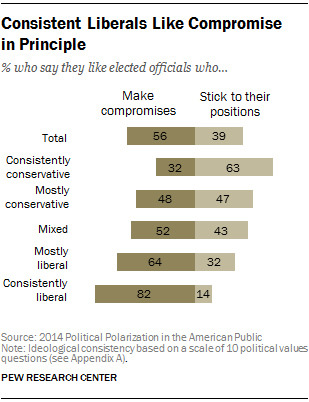The result of all this polarization is that the ideologically rigid have come to dominate the electoral process, taking a more active role in elections out of enthusiasm for their own side or hatred for the other side. They elect candidates who are more attuned to partisanship and less open to negotiating. Voters who want moderation and compromise become disillusioned and withdraw from politics, which further strengthens the hand of the hyper-partisan voters.
What is the end game on all this? It’s tough to say. Self-reinforcing cycles like this are hard to break, and so long as each side has a reliably large base of voters, the cycle will keep on churning. The Republicans, though, are already pushing the extremes of ideological purity — they just kicked out their conservative majority leader in favor of a libertarian crank whose policy positions are rooted in Ayn Randian fantasy. It’s possible they’ll isolate themselves so badly (they’re base is aging and emerging voter demographics are trending against them) that they’ll achieve rump party status and undergo a forced recalibration. You can only lose so many presidential elections before realizing something’s wrong.
Didja catch what Malloy did there? He gave you solid analysis from inside the Two Parties Are All That the USA Can Handle paradigm box.
For the sake of honesty, working in support of any political party when you are not either donating or being paid money is a waste of your time. The system is not responsive to needs of people who don’t pay (damn, I don’t know where to find that academic study that proves it). It’s also constructed to prevent real partisan plurality. That’s why I suggest that anyone who wants to see things work needs to fix the system, not the symptoms, first. The media and content generators (consider the secondary role that political officials, partisan hacks and spin doctors have) have a stake in the stasis of the political hegemony, too.
Pundits and journalists will always scoff at the notion at any more than 2 parties in the USA because 3+ parties mean more work for journalists to do an adequate job on covering politics. Pols will scoff at it because it would mean losing power and more work for them to legislate.

